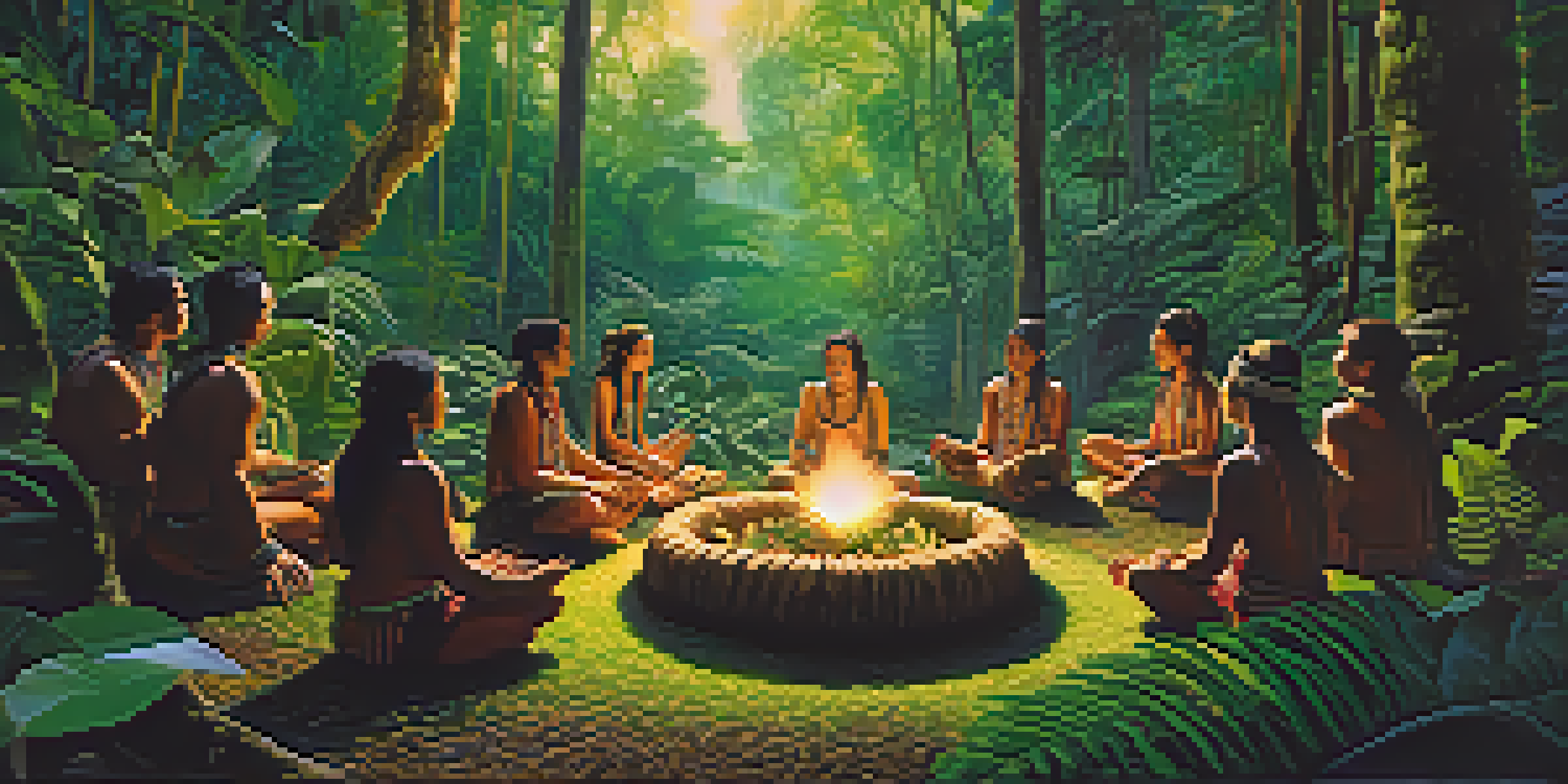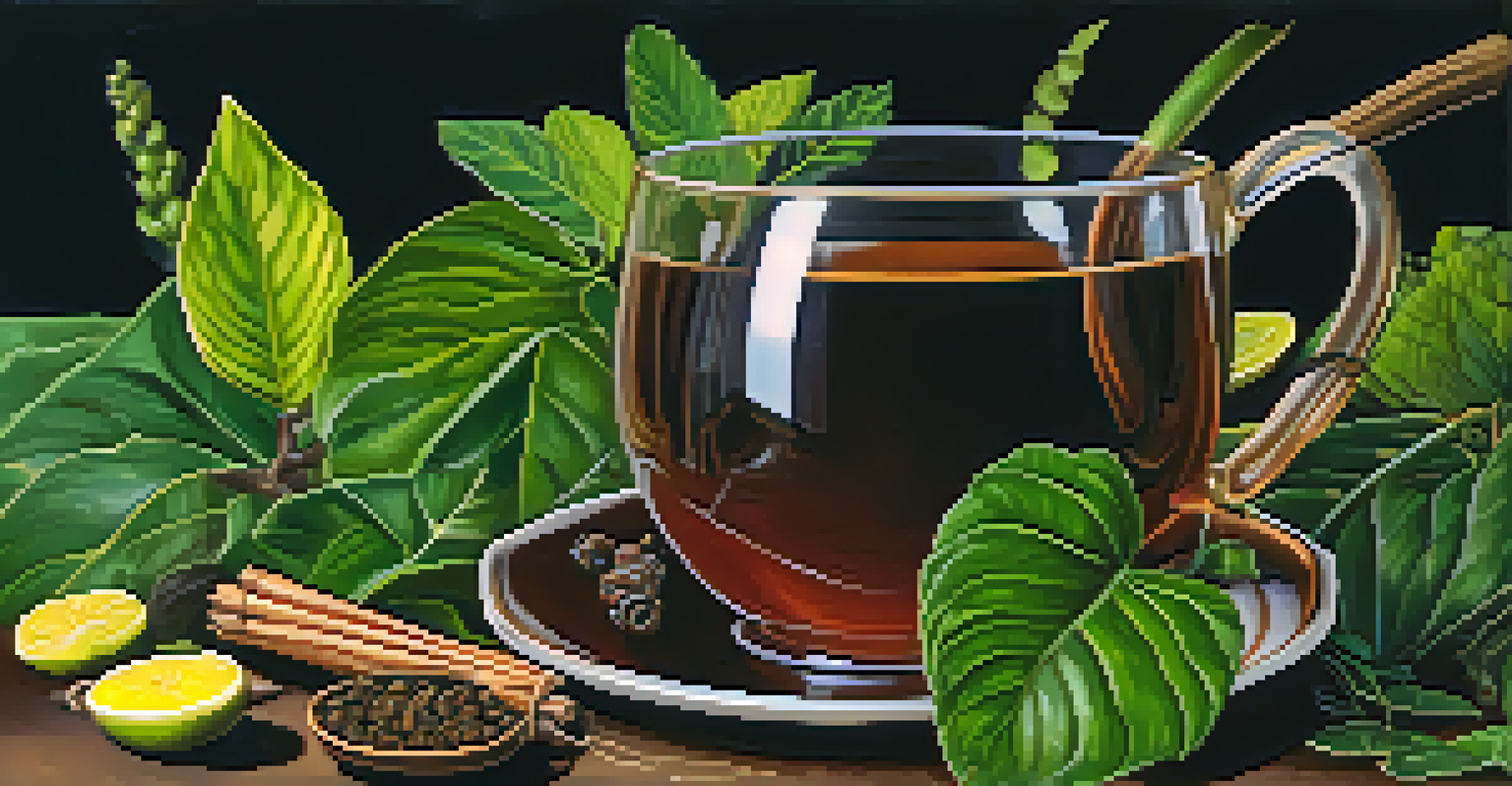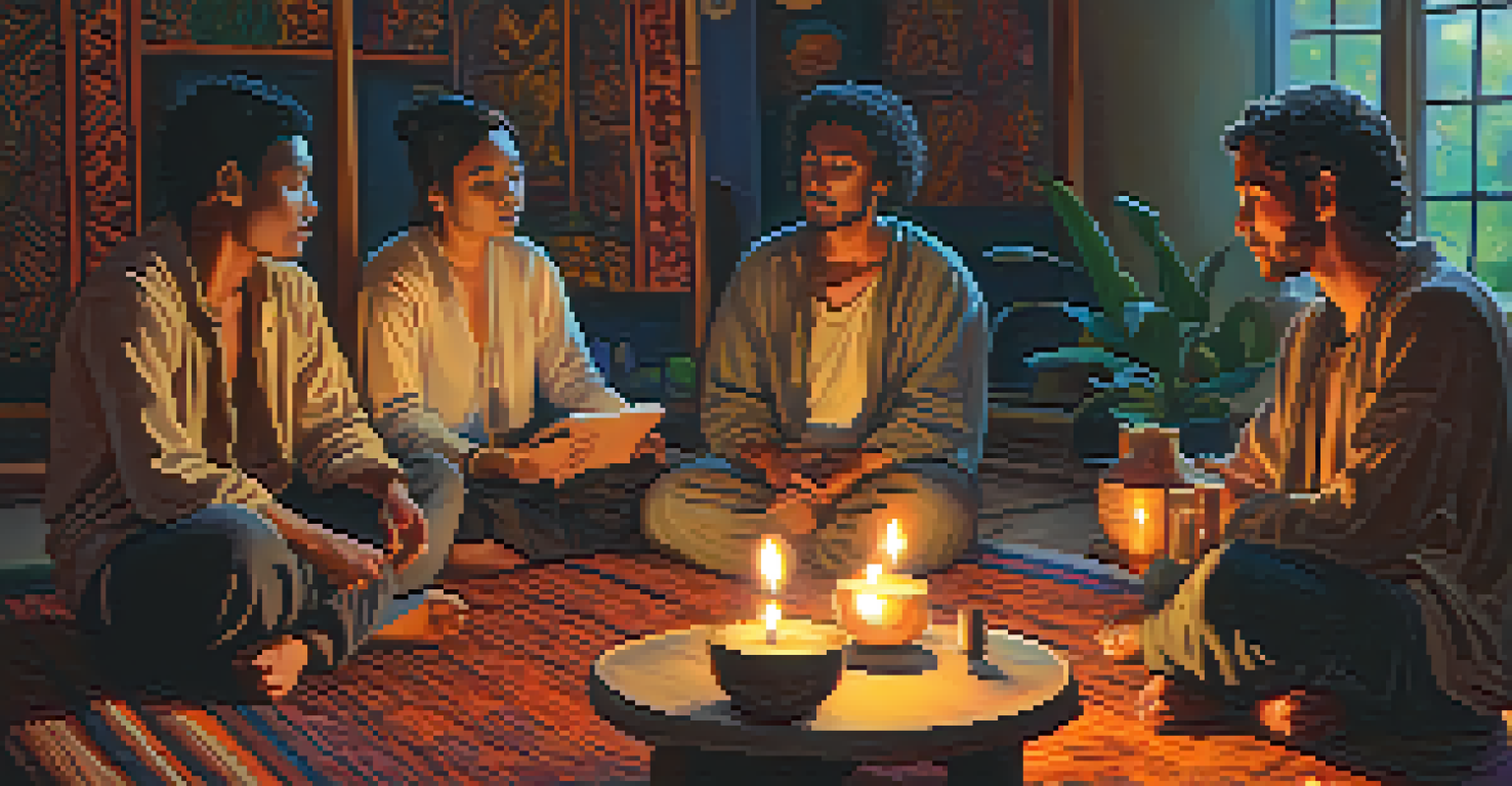Cultural Perspectives on Ayahuasca and Mystical States

Understanding Ayahuasca: A Cultural Overview
Ayahuasca, a potent brew made from the Banisteriopsis caapi vine and other plants, originates from the Amazon rainforest. This traditional medicine has been utilized by indigenous peoples for centuries, serving as a spiritual guide and a means to connect with the divine. Its use has expanded globally, attracting individuals seeking healing, self-discovery, and mystical experiences.
Ayahuasca is a fascinating and complex tool for personal growth and healing, but it's essential that we approach it with respect for its origins and the cultures that have nurtured it for generations.
In many Amazonian cultures, Ayahuasca ceremonies are sacred rituals led by experienced shamans. These ceremonies often involve chanting, music, and communal support, creating a safe space for participants to explore their consciousness. The cultural significance of these practices can't be overstated, as they embody a deep respect for nature and the spiritual world.
As more people from diverse backgrounds engage with Ayahuasca, there’s a growing interest in understanding its cultural roots. This exploration fosters a dialogue about the ethical considerations of using traditional medicines in modern contexts, highlighting the importance of honoring indigenous practices while seeking personal insights.
The Science Behind Ayahuasca and Mystical States
Recent studies have begun to dissect the biochemical processes that occur during Ayahuasca experiences. The primary psychoactive compound, DMT (dimethyltryptamine), is known for inducing profound alterations in consciousness. Understanding how DMT interacts with the brain can help explain the mystical states often reported by users, such as feelings of unity, transcendence, and deep introspection.

During an Ayahuasca ceremony, participants frequently report engaging in vivid visualizations and emotional catharsis. These experiences can lead to transformative insights, often described as 'aha moments' that change one's perspective on life. Many find that these mystical states help them confront personal issues, heal emotional wounds, and foster a greater connection with themselves and the universe.
Cultural Significance of Ayahuasca
Ayahuasca ceremonies, led by experienced shamans, embody deep respect for nature and spirituality within Amazonian cultures.
While the scientific community continues to investigate these phenomena, it's essential to acknowledge that experiences can vary widely among individuals. Factors such as intention, mindset, and the ceremonial environment play crucial roles in shaping the outcomes of Ayahuasca sessions, emphasizing the subjective nature of mystical experiences.
Comparing Ayahuasca to Other Psychedelics
Ayahuasca is often compared to other psychedelics like LSD and psilocybin mushrooms, but it has unique characteristics that set it apart. Whereas LSD can induce long-lasting trips characterized by visual distortions and altered perceptions, Ayahuasca is typically experienced as a more introspective journey. The combination of its natural ingredients and the ritualistic context can create a different emotional landscape.
The challenge is not just about understanding the effects of Ayahuasca, but also about ensuring that it is used ethically and responsibly in the modern world.
Many users of Ayahuasca describe their experiences as deeply spiritual, often reporting a sense of connection to the earth and the cosmos. This contrasts with the more recreational use often associated with substances like MDMA or LSD. In Ayahuasca ceremonies, participants are encouraged to reflect on their lives and seek meaning, which can lead to lasting changes in behavior and mindset.
Moreover, the communal aspect of Ayahuasca ceremonies can enhance the experience, fostering a sense of belonging and shared purpose among participants. This social dimension adds a layer of depth not always present in solitary psychedelic experiences, making Ayahuasca a unique entry point into the world of psychedelics.
The Role of Shamans in Ayahuasca Ceremonies
Shamans play a critical role in Ayahuasca ceremonies, acting as guides and interpreters of the experience. Their extensive knowledge of the plants and the rituals involved is crucial for ensuring a safe and meaningful journey for participants. Many shamans undergo years of training, learning about the spiritual and medicinal properties of various plants in the Amazon rainforest.
During the ceremony, the shaman leads participants through the experience, often using traditional songs known as icaros. These songs are believed to hold spiritual power, helping to navigate the altered states of consciousness and protect participants from negative energies. The shaman's presence provides a sense of security, allowing individuals to explore their inner worlds more freely.
Integration is Key After Ceremonies
Proper integration of Ayahuasca experiences helps participants apply insights to their daily lives, fostering personal growth.
Furthermore, the shaman's role extends beyond the ceremony itself; they often provide aftercare and integration support. This post-ceremony guidance is essential for helping participants make sense of their experiences and apply the insights gained in their everyday lives, reinforcing the importance of community and support in the process.
Cultural Appropriation and Ethical Considerations
As Ayahuasca gains popularity outside of its traditional context, discussions around cultural appropriation have emerged. Many indigenous groups express concern that commercialization dilutes the sacredness of their practices. This raises important questions about who has the right to participate in and lead Ayahuasca ceremonies, highlighting the need for respectful engagement with indigenous cultures.
Ethical considerations also extend to the safety and well-being of participants. Unlike traditional ceremonies, some modern retreats may lack the necessary safeguards and understanding of the cultural significance behind Ayahuasca use. It's crucial for individuals seeking these experiences to conduct thorough research and choose reputable facilitators who prioritize the integrity of the practice.
In navigating these challenges, fostering mutual respect and understanding between cultures is vital. By honoring the traditions of indigenous peoples and engaging in respectful dialogue, we can ensure that the practice of Ayahuasca continues to be a source of healing and spiritual growth for all involved.
Integration: Making Sense of Ayahuasca Experiences
Integration is a critical aspect of the Ayahuasca journey, as it helps participants apply insights gained during the ceremony to their daily lives. Many find that the intense experiences can be overwhelming, and without proper integration, the lessons learned may fade away. This process often involves reflection, journaling, or discussing experiences with supportive communities or therapists.
Some retreats offer integration workshops or follow-up sessions to help participants process their experiences collectively. These gatherings can foster a sense of community, allowing individuals to share their stories and support one another in their healing journeys. This shared experience can be very validating, reinforcing the importance of connection in personal growth.
Ethical Concerns of Global Interest
The growing popularity of Ayahuasca raises important questions about cultural appropriation and the safety of participants in modern retreats.
Ultimately, effective integration encourages individuals to take actionable steps based on their revelations during the ceremony. Whether it’s making lifestyle changes, practicing mindfulness, or seeking further therapy, the goal is to transform insights into tangible improvements in one’s life.
The Future of Ayahuasca: Trends and Perspectives
As interest in Ayahuasca continues to grow worldwide, it's essential to consider the future of this practice. Increasingly, people are seeking authentic experiences that honor its cultural roots while also exploring how these ceremonies can contribute to mental health and well-being. This trend highlights a shift toward integrating ancient wisdom with modern therapeutic practices.
Research into the therapeutic benefits of Ayahuasca is expanding, with studies suggesting its potential to alleviate conditions like depression and PTSD. As more scientific evidence emerges, it may pave the way for broader acceptance and integration of Ayahuasca in mainstream mental health care. However, this must be balanced with cultural sensitivity and respect for indigenous practices.

The future of Ayahuasca also depends on how communities and facilitators approach its use. Sustainable practices, ethical considerations, and respect for cultural heritage will be crucial in shaping how Ayahuasca is experienced and understood. By prioritizing these aspects, we can ensure that this ancient tradition continues to thrive and provide healing for generations to come.